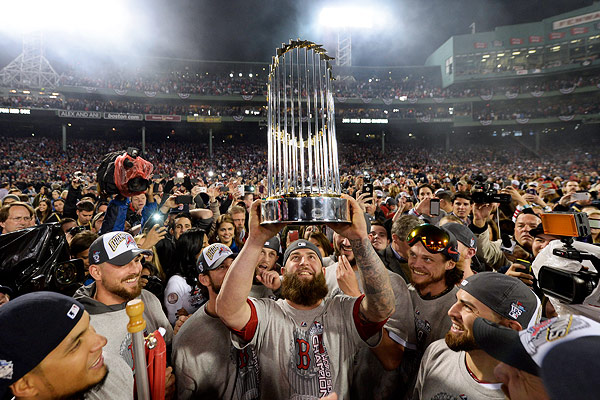M
MentalDisabldLst
Guest
Jayson Stark has a lengthy column making a case that MLB currently has better parity than the (salary-capped) NFL. He does this every year, but it's probably worth discussing. It boils down to this:
- Over the past few years, a greater percentage of playoff teams in the NFL had been playoff teams the year before than the comparable percentage in MLB
- 5 teams have won 16 of the last 18 AFC titles (Broncos, Ravens, Patriots, Steelers, Colts)
- In the past 5 years, six NFL teams have lacked a single winning season, while only two MLB teams (HOU & NYM) have lacked a winning season
- Payroll disparities in MLB aren't destiny: 6 of the top 9 teams in payroll missed the playoffs (same ratio as all teams), including the $220M/yr Yankees, and 3 of the bottom-5 teams in payroll did make the playoffs.
- In particular, the Yankees have only won a single AL title in the last 10 years, which while not evidence of anything (much less the proof that Stark is claiming), is still a juicy fact we can enjoy reading.
- If you go back farther, over the past 25 years, only 13 of the 32 NFL franchises (41%) have won a title, whereas 16 of 30 MLB franchises (53%) have done so
The rest of the article is mostly content-free snark, but this is a decent anecdotal start to what's an interesting question for sports fans.
My real question is, what would be actually-good metrics to use in order to measure parity between pro sports leagues? Some ideas off the top of my head:
- Playoff-repeat rate of each team (I guess correlation coefficient between making/not-making playoffs in a given year, and doing the same the next year) in the league
- Winning-season repeat rate (as above - taking all teams, what's the correlation between one season and the next)
- What are the odds that a top team (say, one that makes the final 4 in its sport) might lose to a team in the bottom quartile of the league in any given game? In other words, if you're a fan of a team that's down on its luck, do you even have a prayer of showing up to a game against a good team and seeing your team pull an upset? By this measure, I imagine the NHL is by far the most chaotic in terms of "reliability" of its results, and the NFL has very few cases where a top team loses to a bottom-feeder.
So, what would be good metrics? Are there any more-intelligent studies than what Stark did above (likely while sitting on the can this morning)? Does baseball truly have the best parity despite its lack of salary cap?
- Over the past few years, a greater percentage of playoff teams in the NFL had been playoff teams the year before than the comparable percentage in MLB
- 5 teams have won 16 of the last 18 AFC titles (Broncos, Ravens, Patriots, Steelers, Colts)
- In the past 5 years, six NFL teams have lacked a single winning season, while only two MLB teams (HOU & NYM) have lacked a winning season
- Payroll disparities in MLB aren't destiny: 6 of the top 9 teams in payroll missed the playoffs (same ratio as all teams), including the $220M/yr Yankees, and 3 of the bottom-5 teams in payroll did make the playoffs.
- In particular, the Yankees have only won a single AL title in the last 10 years, which while not evidence of anything (much less the proof that Stark is claiming), is still a juicy fact we can enjoy reading.
- If you go back farther, over the past 25 years, only 13 of the 32 NFL franchises (41%) have won a title, whereas 16 of 30 MLB franchises (53%) have done so
The rest of the article is mostly content-free snark, but this is a decent anecdotal start to what's an interesting question for sports fans.
My real question is, what would be actually-good metrics to use in order to measure parity between pro sports leagues? Some ideas off the top of my head:
- Playoff-repeat rate of each team (I guess correlation coefficient between making/not-making playoffs in a given year, and doing the same the next year) in the league
- Winning-season repeat rate (as above - taking all teams, what's the correlation between one season and the next)
- What are the odds that a top team (say, one that makes the final 4 in its sport) might lose to a team in the bottom quartile of the league in any given game? In other words, if you're a fan of a team that's down on its luck, do you even have a prayer of showing up to a game against a good team and seeing your team pull an upset? By this measure, I imagine the NHL is by far the most chaotic in terms of "reliability" of its results, and the NFL has very few cases where a top team loses to a bottom-feeder.
So, what would be good metrics? Are there any more-intelligent studies than what Stark did above (likely while sitting on the can this morning)? Does baseball truly have the best parity despite its lack of salary cap?



